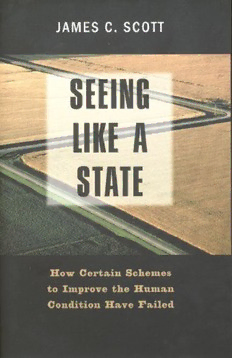
Seeing Like a State: How Certain Schemes to Improve the Human Condition Have Failed PDF
Preview Seeing Like a State: How Certain Schemes to Improve the Human Condition Have Failed
Seeing Like a State YALE AGRARIAN STUDIES The Institution for Social and Policy Studies at Yale University The Yale ISPS Series Like a State How Certain Schemes to Improve the Human Condition Have Failed James C. Scott Yale University Press New Haven and London This is a book in the Yale Agrarian Studies Series, James C. Scott, series editor. Copyright 0 1998 by Yale University. All rights reserved. This book may not be reproduced, in whole or in part, including illustrations, in any form (beyond that copying permitted by Sections 107 and 108 of the U.S. Copyright Law and except by reviewers for the public press), without written permission from the publishers. Designed by James J. Johnson and set in Aster type by Running Feet Books, Durham, NC. Printed in the United States of America by Vail-Ballou Press, Binghamton, New York. Library of Congress Cataloging-in-Publication Data Scott, James C. Seeing like a state : how certain schemes to improve the human condition have failed 1 James C. Scott. p. cm.-(Yale agrarian studies) (The Yale ISPS series) Includes bibliographical references and index. ISBN 0-300-07016-0 (cloth : alk. paper) 0-300-07815-3 (pbk.: alk. paper) 1. Central planning-Social aspects. 2. Social engineering. 3. Authoritarianism. I. Title. 11. Series. 111. Series: The Yale ISPS series. HD87.5.S365 1998 338.9-dc2 1 97-26556 A catalogue record for this book is available from the British Library. The paper in this book meets the guidelines for permanence and durability of the Com- mittee on Production Guidelines for Book Longevity of the Council on Library Re- sources. For Louise, again, always OWENW: hat is happening? YOLLANID'm: not sure. But I'm concerned about my part in it. It's an eviction of sorts. OWENW: e're making a six-inch map of the country. Is there something sinister in that? YOLLAND: Not in . . . OWENA: nd we're taking place names that are riddled with confusion and . . . YOLLANWDh:o 's confused? Are the people confused? OWENA:n d we're standardising those names as accurately and as sen- sitively as we can. YOLLANSDom: ething is being eroded. -Brian Friel. Translations 2.1 Contents Acknowledgments ix Introduction 1 Part 1. State Projects of Legibility and Simplification 9 Chapter 1. Nature and Space 1 1 Chapter 2. Cities, People, and Language 53 Part 2. Transforming Visions 85 Chapter 3. Authoritarian High Modernism 87 Chapter 4. The High-Modernist City: An Experiment and a Critique 103 Chapter 5. The Revolutionary Party: A Plan and a Diagnosis 147 Part 3. The Social Engineering of Rural Settlement and Production 18 1 Chapter 6. Soviet Collectivization, Capitalist Dreams 193 Chapter 7. Compulsory Villagization in Tanzania: Aesthetics and Miniaturization 223 Chapter 8. Taming Nature: An Agriculture of Legibility and Simplicity 262 Part 4. The Missing Link 307 Chapter 9. Thin Simplifications and Practical Knowledge: Metis 309 Chapter 10. Conclusion 342 Notes 359 Sources for Illustrations 433 Index 435 Acknowledgments This book has been longer in the making than I would care to admit. It would be nice to be able to claim that it just took that long to think it through. Nice, but not truthful. A nearly fatal combination of malinger- ing and administrative chores accounts for part of the delay. For the rest, the scope of the book simply expanded, in an academic version of Parkinson's Law, to fill all the space that I would give to it. Finally, I had to call an arbitrary halt or else start thinking of it as a life's work. The scope of the book together with the time it took to complete it explain the long list of intellectual debts I have accumulated along the way. A full accounting of them would be interminable except for the fact that I realize some of my creditors would just as soon not be asso- ciated with the final product. Though I shall not implicate them here, I owe them nonetheless. Instead of turning my argument in the direction they urged, I took their criticisms to heart by fortifying my case so that it would better answer their objections. My other intellectual creditors, having failed to disavow the final product in advance, will be named here and, it is to be hoped, implicated. Some of my debts are to institutions. I spent the 1990-91 academic year at the Wissenschaftskolleg zu Berlin as a recipient of their hospi- tality and largesse. The temptation of living for a time in Berlin, just a year after the Wall came down, proved irresistible. After physically la- boring for six weeks on an ex-collective farm on the Mecklenburg Plain in eastern Germany (an alternative that I dreamed up to avoid sitting for six weeks in Goethe Institute classes with pimply teenagers), I hurled myself at the German language, Berlin, and my German col-
